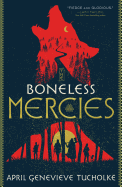
The Boneless Mercies's 17-year-old narrator, Frey, is an adult in her own right. Her parents died when she was 12, and her uncle sold her to a Bliss House; when she was considered old enough to make the move from the "kitchen to the bedroom," she fled. She was found by an older woman named Siggy who took her in and introduced her to the death trade. "They called us... the Boneless Mercies," Frey tells the reader. "They said we were shadows, ghosts, and if you touched our skin, we dissolved into smoke. We made people uneasy, for we were women with weapons. And yet the Mercies were needed. Men would not do our sad, dark work."
Though Siggy has passed on to Holhalla, Frey is not alone: she is accompanied by the Sea Witch Juniper; Runa and Ovie, two young women who "under[stand] darkness and carr[y] it with them"; and Trigve, a young man the Mercies saved from freezing to death. Frey, Runa, Ovie and Juniper barely make a living as purveyors of merciful death and have grown weary of killing. "I was a Mercy-girl with no family, no home, no fortune," Frey says to the reader, "and yet my blood sang of glory." Frey and the Mercies decide to seek fame and fortune by traveling across Vorseland to defeat a beast that has been terrorizing the northern jarldom.
April Genevieve Tucholke's (Between the Devil and the Deep Blue Sea) genderbent Beowulf is as dark and quietly mysterious as the fantastical winter in which it takes place. Her alternate Scandinavia is a land of powerful magics and eerie landscapes, bloodlust and genuine, deep friendships that is full of foreboding, menace and eventual (though not unfettered) glory. --Siân Gaetano, children's and YA editor, Shelf Awareness

